Program Description
Program Structure
The Graduate Program in Statistics at UFRJ leads to the titles of M.Sc. and Dr.Sc. in Statistics. Both Dr.Sc. and M.Sc. students attend graduate courses and seminars in their first academic year. From 2001 to 2015, each lecture term lasted 13 weeks (with 3 periods per year). From 2016 until now, each lecture term lasts 15 weeks (with 2 periods per year). M.Sc. Seminars lasts for six months and 1 (one) credit point will be granted for attending and understanding them. In addition to attending the seminars, the students must prepair a manuscript describing some of the given talks. At the end of the first academic year, all the students must have attended to a minimum of 360 hours of classes in regular lectures and 20 hours of seminars. Dr.Sc. studends who have already obtained their Ms.Sc. degree from another program may request exemption from courses already taken in their original programs if equivalence is verified. At the end of the first year, Dr.Sc. and M.Sc. students follow different paths, which are presented below.
-
The summary of the activities of the master’s course are presented below.
M.Sc.ACADEMIC YEARPERIODACTIVITIES1st1stCoursesProbability TheoryStatistical Inference2ndCoursesComputational StatisticsGeneralized Linear ModelsMarkov Chains1 elective courseAllM.Sc. Seminars2ndAllElaboration of dissertation2ndDefense of dissertation -
The Dr.Sc. course has its structure based on semiannual disciplines of Graduate Studies, Seminars, Qualification Exams and Doctoral Thesis. In addition to the courses taken in the 1st year, the students must, in their 2nd year, take 2 doctoral courses (with 60 hours of classes each) and 2 Doctoral Seminars (with 15 hours of classes each). Thus, in the 2nd year, they will complete 120 hours of classes in courses and 30 hours in seminars. In addition to the total hours of the 1st year, a minimum of 450 hours of classess in regular courses and 50 hours of classes in seminars is reached. Students with a master’s degree from another program may be excused from some subjects if equivalence with subjects already taken in their original programs is verified.
The permanence in the doctorate also presupposes a good performance of the students in the coursed of the 1st and 2nd years. Students with a master’s degree in another graduate program eventually excused from courses must still attend at least 104 hours in master’s courses and pass the Master’s Qualification Exam if apointed to take it.
From that point, students move on to the 2nd year, when they are expected to:
- take 2 advanced doctoral couses of four hours per week;
- take 2 Doctoral Seminars with presentation and discussion of papers;
- elaborate reports on talks given in the M.Sc. Seminars.
During the 2nd year (and after taking courses), students are submitted to the Preliminary Qualification Exam. This exam is oral and deals with the content of two doctoral courses in the program. A board of 3 professors of the program decides whether students continue in the program to prepare an original research work and elaborate a doctoral thesis.
Until the end of the 3rd year, students are submitted to the Doctoral Qualification Exam. They must prepare the presentation of a research project detailing their thesis proposal that must be defended. A board examining board formed by 3 professors (excluding the advisor and including at least one professor external to the program) decides if the student may continue on research activities. Even after passing the exame, students are encouraged to continue participating in seminars.
The summary of the activities of the doctoral course are presented below, considering the two main areas: Statistics and Probability.
Dr.Sc. (Statistics)ACADEMIC YEARPERIODACTIVITIES1st1stCoursesProbability TheoryStatistical Inference2ndCoursesComputational StatisticsGeneralized Linear ModelsMarkov Chains1 elective doctoral courseAllM.Sc. SeminarsEnd of the 2nd periodPreliminary Qualification Exam2nd1stCourses1 elective doctoral course1 doctoral seminar2ndCourses1 elective doctoral course1 doctoral seminar3rd1stQualification ExamAllElaboration of thesis4thAllElaboration of thesis2ndDefense of thesisDr.Sc. (Probability)ACADEMIC YEARPERIODACTIVITIES1st1stCoursesProbability TheoryStatistical Inference2ndCoursesMarkov Chains2 elective coursesAllM.Sc. Seminar2nd1stCourses1 doctoral elective course*1 doctoral seminar2ndCourses1 elective doctoral course*1 doctoral seminar3rd1stQualification ExamAllElaboration of thesis4thAllElaboration of thesis2ndDefense of thesis* Depending on the students’ research topic, they may be allowed to take elective courses in the Graduate Program in Mathematics at UFRJ that are considered important in their basic education. We cite as examples: Measure Theory, Functional Analysis, Spectral Theory and Partial Differential Equations.



